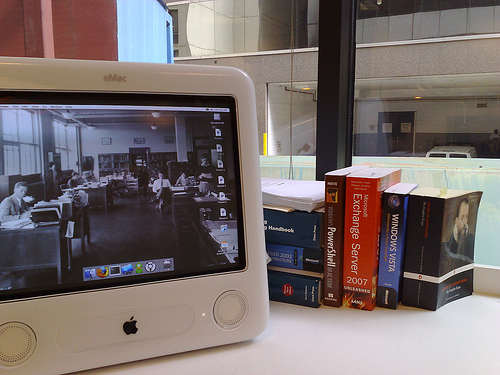UPDATE: We've summarized much of the series this article is part of in a new report, Policies for Shareable Cities: A Sharing Economy Policy Primer for Urban Leaders. Get your free copy here today.
Cities that wish to promote policies of sharing in the workplace can begin in their own city departments and programs. Public entities tend to set good examples for other employers by providing civil servants with benefits that are less commonly offered by private employers. For example, before many private employers were willing to do so, some city governments began to offer health benefits to same-sex partners of public employees. In the realm of workplace sharing, cities can also set good examples.

The workplace is ripe with sharing solutions. Photo credit: Reed Wiedower. Used under Creative Commons license.
This year, we’ve seen Mutual Aid in Motion.
From scaling sharing hubs to Mutual Aid 101 trainings, we’re helping communities build the tools they need.
Every dollar fuels lasting resilience – proving that when we move together, we all move forward.
The workplace offers fertile ground for sharing by virtue of the fact that people often spend up to – or more than – half of their waking hours at work. People also invest a great deal of money in goods and services that enable them to work, such as daycare for children, cars for commuting, and meals during work. Cities could implement a handful of practices and programs that promote sharing and reduce certain burdens on employees:
-
Facilitate the creation of workplace childcare cooperatives: If an employer offers employees use of rooms and other areas within a workplace and gives employees flexible work schedules, employees could, if they choose, make cooperative arrangements for workplace childcare. In such an arrangement, employees could rotate childcare responsibilities during the day and sometimes hire others to come in and provide care.
-
Provide access to shared vehicles: Many city employees could avoid driving to work if they had access to shared vehicles at work for appointments during the day. Cities could form partnerships with local car-sharing programs in order to provide shared vehicles on site. Cities could also pay for employees to make their own vehicles part of a peer-to-peer car rental service, such as RelayRides or GetAround. That way, vehicles that employees normally bring to work could be available to co-workers for use during the day.
-
Facilitate and incentivize carpooling and vanpooling: An employer could grease the wheels of workplace carpooling by helping to match employees with one another for carpooling and/or by supplying or subsidizing the cost of a van for vanpooling. An employer could also facilitate workplace carpooling by allowing for some flexibility in work schedules and by being forgiving when a carpool makes someone late. In dense urban areas, where many city employees do not have access to free parking, an employer could provide free and reserved parking spaces for employees that carpool to work with other employees.
-
Facilitate workplace meal sharing: Workers that do not have time to make and pack lunches often spend a good deal of money eating out during lunch hours. Employers could help to lighten that burden by facilitating meal sharing among employees. Employees could implement a rotation plan, where each employee helps to make lunch for others once or twice per month. An employer could enable this by providing a well-stocked kitchen with a dishwasher, and by allowing for some flexibility with work schedules of employees when their cooking rotations come up.
-
Job sharing: Flexible work options can contribute significantly to employee health and happiness. Many public jobs are designed as full-time positions, but where possible, cities should explore the possibility that one position could be split between two people, or that three positions could be split among two people, and so on. Job sharing can also have many benefits to the employer, since such an arrangement helps to ensure back-up in the event that one person is not available, and may generally help employers to recruit and retain employees.
This post is one of 15 parts of our Policies for a Shareable City series with the Sustainable Economies Law Center:
- Car Sharing and Parking Sharing
- Ride Sharing
- Bike Sharing
- Shareable Commercial Spaces
- Shareable Housing
- Homes as Sharing Hubs
- Shareable Neighborhoods
- Shareable Workspaces
- Recreational and Green Spaces
- Shareable Rooftops
- Urban Agriculture
- Food Sharing
- Public Libraries
- The Shareable City Employee
- How to Rebuild the City as a Platform

